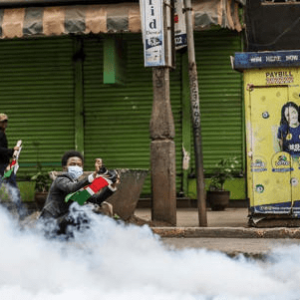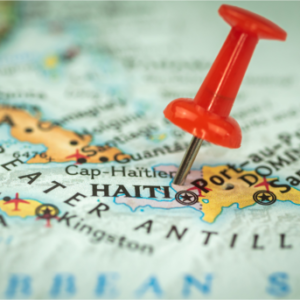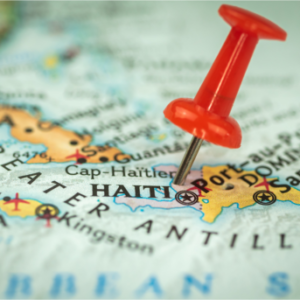25 hurricanes and 10 hurricanes are on the way to hit the country, according to Civil Protection
Did you know that from June 1 to November 30, 2024, there are about 25 hurricanes and 10 hurricanes Civil protection announce that can hit Haiti? If nature does not change its mind, this cyclonic season will be very bad. That is why, AyiboPost draws your attention to all the necessary security measures you must adopt at this time.
It is not a novelty for people in Haiti. It is “every year, the cyclonic season comes with heavy rain, wind and floods”, according to what meteorologist Marcelin Esterlin reminds us.
But “Haiti has become even more fragile compared to other countries in the Caribbean, because of the State that does not plan the territory, the constructions that are not adapted and the population that is not informed”, is what Emmanuel Pierre notes, as the former director of operations at the Operations Center national emergency (COUN).
What can you do if you notice high winds, floods, landslides and other natural phenomena in your home area?
The first important thing to do during a cyclonic period is to put your house in order.
- All important papers must be in a safe place.
- Make sure all the windows, sheet metal and house frames are strong.
- For those who have a car, we must make sure it always has gas, whenever there is an emergency that requires you to move quickly.
- Put food that can last several days, treated water and medicine at home, in case we have difficulty moving.
- During strong winds and rains, avoid going out unless absolutely necessary. We must shelter in a place that will not expose us to danger, inside the house. We must not stay on the balcony to avoid falling, nor near the glass window! Because at any moment wind or other debris can break them. If the house is made of sheet metal, we must watch so that the debris falling on it does not injure us.
- During the passage of the hurricane, if you notice cracks in the walls of the house, hide under a table or any other safe place in the house until you move.
And if we live in a bad area, how can we protect ourselves?
Emmanuel Pierre, who is responsible for civil protection, advises us to “move to a safe place, because the rescue services may not be able to reach us in time.” But while we are moving, we must remember to take medicine and all important documents such as ID, house deed, land deed, car deed, etc.
Don’t forget to show solidarity with the neighbors who are in danger.
Always listening to the radio and the weather before we go out is very important at these times.
The cyclonic period that gives a lot of rain, generally, causes mountain slopes that were previously without trees and houses built on them will not be able to hold all the amount of rainwater they receive. These mountain slopes that become too heavy can “unbolt with everything on it and slide down”, according to what meteorologist Esterlin explains. It’s what we call the “ground breaking”. This phenomenon has already happened in the municipality of Cap Haitian, in May 2024, where ten citizens died.
So, if you live on a mountain slope, you must move.
Civil protection also talks about Flooding, which happens when high water invades and covers a certain space, when it rains a lot, when the sea water invades an area due to high waves. It can happen when a drainage is not done properly, when the type of soil such as limestone causes the groundwater to rise, when there is improper agriculture, when a river is diverted or it overflows, etc.
Always listening to the radio and the weather before we go out is very important at these times.
If your home is flooded, don’t go down to the ground floor, go up to another floor until you can evacuate. If the house does not have a floor, run to another place that is not exposed to danger. Cut off gas and electricity in the house to avoid explosions and electrocution.
If you are on the street during rain, avoid driving on flooded roads so that you don’t fall into a pothole without realizing it.
On May 21, 2024, the population of Basin-Ble commune, Northwest department observed a «big wind» similar to a tornado. This phenomenon caused several injuries and destroyed some houses. According to the organization «Unité hydroMétéorologique d’Haïti» (UHM), even if there are not enough details to say it was a Tornado, we must expect such a big «wind whirlwind» during the cyclonic season.
Now, let’s take a quick look at some special words or terms that you may often hear about these days, so that you can better understand.
Experts use wind speed to classify hurricanes and hurricanes and establish their impact. Thus, they speak of a tropical depression when there is a wind force below 63 kilometers per hour. Whereas, there are tropical storms when the wind is from 63 to 117 kilometers. Which can spawn heavy rain.
If you are on the street during rain, avoid driving on flooded roads so that you don’t fall into a pothole without realizing it.
Researchers use the term “hurricane” to categorize tropical cyclones that exceed 119 kilometers in air. Among the 10 hurricanes announced that may pass over the country, there are 7 of them in category 3. Let me explain what this means, while I also help you understand the different categories that exist.
A category 1 hurricane has winds of 119 to 154 kilometers per hour and can bring down rivers and cause creeks to overflow. If you live near rivers that are prone to overflowing, the first thing you should do is move during this time. Those who live in rural areas and look after their animals, must avoid tying them by the river during the night.
For category two (2) itself, roofs can be torn off, windows can be damaged, billboards can be blown, sea waves can rise seventeen heights. At that time, the winds boasted from 154 to 178 kilometers. Move everything that the wind can carry away such as: trash, tools, posters, bulbs, antennas, etc. Remove and pack all light objects from the walls of the house to prevent them from falling. For example, clocks, tables, frames, trinkets, etc. Tape and glue or put strong curtains in front of the glass doors and windows of the house to avoid injury, if they were to break.
Among the 10 hurricanes announced that may pass over the country, there are 7 of them in category 3.
We are talking about category three (3), when the winds exceed from 178 to 209 kilometers per hour. When this is a big disaster. Uprooted trees, sea waves rise to the limit of tsunami, etc. If you live near the sea, the first thing you need to do is move. Do not enter the sea when it is rough with big waves, if you are in it, get out quickly. The sailors must remove the small boats from the sea and tie them firmly far from the shore.
When it’s Category 4, the winds range from 210 to 250 kilometers, it can tear down houses, uproot trees, sea waves rise, etc.
Category 5 is even a complete disaster and the winds exceed 250 kilometers.
Before we finish, I must draw your attention to the 4 alerts that we often hear about when we are in a cyclonic situation: the green, yellow, orange and red alerts. What do they even mean?
First of all, you must know, each of them is there to warn us how the weather hazards are advancing.
The green alert means that there is no particular vigilance in place yet. The yellow alert is a “surveillance phase” in relation to a threat that can occur in 2 to 3 days. When the threat starts to become clear, we are on orange alert. This means we are preparing to face a hurricane. The red alert, itself, indicates that we must be even more vigilant and stop all activities because there is a threat of a hurricane coming in about 8 to 18 hours.
If you live near the sea, the first thing you need to do is move. Do not enter the sea when it is rough with big waves, if you are in it, get out quickly.
In addition to the 4 alert levels that are most active, there are 2 more that are violet and gray, which are there to establish vigilance regarding hurricanes and hurricanes.
The violet alert is above all, it mainly concerns hurricanes and hurricanes. It means that there is a big danger coming in the next 3 to 6 hours. And the impacts will be catastrophic with winds exceeding 200 kilometers.
The gray alert itself is good news, it indicates that the hurricane will move away and the danger will decrease.
So my friends, in the cyclonic season we must always be vigilant and pay attention to these different alerts.
Finally, it is important to remember that it is necessary to be in solidarity with each other at this time.
▶ Presentation: Daphena Rémédor
▶ Research and Writing: Jérôme Wendy Norestyl
▶ Camera and Editing: Riquemi Perez
▶ Supervision: Cherub Jerome
To stay connected with AyiboPost:
▶ Integrated channel Telegram now in: click here
▶ Integrated channels WhatsApp now in: Click here
▶ Community Integration WhatsApp now in: click here










